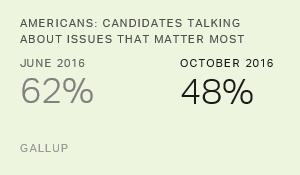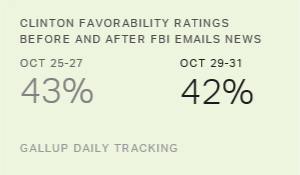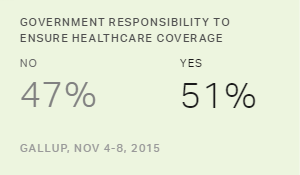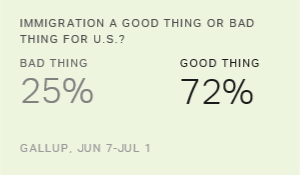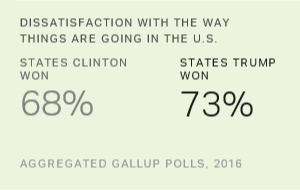Less than half of Americans, down more than 10 percentage points since June, now say the presidential candidates are talking about the issues that matter to them -- the people. This no doubt reflects the heavy emphasis on personality and character traits that has overtaken news coverage of the campaign in recent weeks, in essence crowding out discussion of public policy.
But what if campaign coverage were to focus more on the candidates' issue positions? How would each candidate fare? Gallup undertook an exploratory project to assess this, asking a cross-section of national adults in the Gallup Panel how much they agree with the candidates' positions on each of 40 issues, or whether they know nothing about them. These answers were then related to panelists' stated likelihood of voting for each candidate -- Donald Trump and Hillary Clinton -- on Nov. 8. (See all 40 issues that Gallup examined at the end of this article.)
The results in this report are based on separate multivariate analyses restricted to respondents who reported either being likely to vote for Trump or being likely to vote for Clinton. The analysis determined which issues are most (and least) related to a person's being "very likely" as opposed to just "somewhat likely" to support each candidate.
The following 11 issues are the most related to strong support for Trump's candidacy of the 40 issues tested:
| Reducing terrorism in the U.S. | ||||||||||||||||||||||||||||||||||||||||||||||||||||||||||||||||||||||||||||||||||||||||||||||||||||
|---|---|---|---|---|---|---|---|---|---|---|---|---|---|---|---|---|---|---|---|---|---|---|---|---|---|---|---|---|---|---|---|---|---|---|---|---|---|---|---|---|---|---|---|---|---|---|---|---|---|---|---|---|---|---|---|---|---|---|---|---|---|---|---|---|---|---|---|---|---|---|---|---|---|---|---|---|---|---|---|---|---|---|---|---|---|---|---|---|---|---|---|---|---|---|---|---|---|---|---|---|
| Immigration | ||||||||||||||||||||||||||||||||||||||||||||||||||||||||||||||||||||||||||||||||||||||||||||||||||||
| Dealing with the flow of illegal immigrants coming into the U.S. from Mexico | ||||||||||||||||||||||||||||||||||||||||||||||||||||||||||||||||||||||||||||||||||||||||||||||||||||
| Creating jobs | ||||||||||||||||||||||||||||||||||||||||||||||||||||||||||||||||||||||||||||||||||||||||||||||||||||
| Plans for the U.S. economy | ||||||||||||||||||||||||||||||||||||||||||||||||||||||||||||||||||||||||||||||||||||||||||||||||||||
| Support for Israel | ||||||||||||||||||||||||||||||||||||||||||||||||||||||||||||||||||||||||||||||||||||||||||||||||||||
| Gun rights and the Second Amendment | ||||||||||||||||||||||||||||||||||||||||||||||||||||||||||||||||||||||||||||||||||||||||||||||||||||
| Fighting ISIS in Iraq and Syria | ||||||||||||||||||||||||||||||||||||||||||||||||||||||||||||||||||||||||||||||||||||||||||||||||||||
| Reducing the federal deficit | ||||||||||||||||||||||||||||||||||||||||||||||||||||||||||||||||||||||||||||||||||||||||||||||||||||
| Employment and wages | ||||||||||||||||||||||||||||||||||||||||||||||||||||||||||||||||||||||||||||||||||||||||||||||||||||
| Relations with Muslims in the U.S. and around the world | ||||||||||||||||||||||||||||||||||||||||||||||||||||||||||||||||||||||||||||||||||||||||||||||||||||
| Gallup | ||||||||||||||||||||||||||||||||||||||||||||||||||||||||||||||||||||||||||||||||||||||||||||||||||||
Clinton's top 12 issue positions, based on the association of the 40 issues with her strength of support, are as follows:
| Race relations in the U.S. | ||||||||||||||||||||||||||||||||||||||||||||||||||||||||||||||||||||||||||||||||||||||||||||||||||||
|---|---|---|---|---|---|---|---|---|---|---|---|---|---|---|---|---|---|---|---|---|---|---|---|---|---|---|---|---|---|---|---|---|---|---|---|---|---|---|---|---|---|---|---|---|---|---|---|---|---|---|---|---|---|---|---|---|---|---|---|---|---|---|---|---|---|---|---|---|---|---|---|---|---|---|---|---|---|---|---|---|---|---|---|---|---|---|---|---|---|---|---|---|---|---|---|---|---|---|---|---|
| Providing pre-K/preschool for more American children | ||||||||||||||||||||||||||||||||||||||||||||||||||||||||||||||||||||||||||||||||||||||||||||||||||||
| The distribution of income and wealth in the U.S. | ||||||||||||||||||||||||||||||||||||||||||||||||||||||||||||||||||||||||||||||||||||||||||||||||||||
| The size and efficiency of the federal government | ||||||||||||||||||||||||||||||||||||||||||||||||||||||||||||||||||||||||||||||||||||||||||||||||||||
| The strength and size of the U.S. military | ||||||||||||||||||||||||||||||||||||||||||||||||||||||||||||||||||||||||||||||||||||||||||||||||||||
| Repairing infrastructure in the U.S. | ||||||||||||||||||||||||||||||||||||||||||||||||||||||||||||||||||||||||||||||||||||||||||||||||||||
| Fighting ISIS in Iraq and Syria | ||||||||||||||||||||||||||||||||||||||||||||||||||||||||||||||||||||||||||||||||||||||||||||||||||||
| Plans for the U.S. economy | ||||||||||||||||||||||||||||||||||||||||||||||||||||||||||||||||||||||||||||||||||||||||||||||||||||
| Creating jobs | ||||||||||||||||||||||||||||||||||||||||||||||||||||||||||||||||||||||||||||||||||||||||||||||||||||
| Veterans issues | ||||||||||||||||||||||||||||||||||||||||||||||||||||||||||||||||||||||||||||||||||||||||||||||||||||
| Abortion | ||||||||||||||||||||||||||||||||||||||||||||||||||||||||||||||||||||||||||||||||||||||||||||||||||||
| Tax reform | ||||||||||||||||||||||||||||||||||||||||||||||||||||||||||||||||||||||||||||||||||||||||||||||||||||
| Gallup | ||||||||||||||||||||||||||||||||||||||||||||||||||||||||||||||||||||||||||||||||||||||||||||||||||||
Reducing terrorism is the top driver of strong support for Trump among panel respondents, followed closely by immigration generally and Mexican immigration in particular. As part of his anti-terrorism platform, Trump initially called for banning all Muslims worldwide from entering the U.S., although he has since modified his position to focus on countries with the highest risk of exporting terrorism. Among Trump supporters, strong agreement with his positions on these issues is most related to being very likely to vote for him. These are issues Trump has emphasized throughout his campaign.
After these three, half of Trump's remaining drivers of support are related to the economy: employment and wages, his plans for the economy generally, reducing the deficit, and job creation. This makes sense in the context of Trump's populist-oriented appeal among sectors of the working class, evident particularly when he campaigned in the Republican primaries. It also suggests that addressing these subjects would, in theory, be his smartest strategy to energize his supporters and gain new supporters in the final days of the campaign.
Defending citizens' gun rights, supporting Israel and fighting ISIS in Iraq and Syria also make the list, indicating that Trump's commentary on these issues resonates with many of his strongest supporters. He has promised strong support for Israel, including opposition to the Iran nuclear deal and recognizing Jerusalem as Israel's capital.
A different set of issues emerges as most related to strength of support for Clinton's candidacy. Strong agreement with Clinton's position on race relations in the U.S. is most highly related to being very likely to vote for her. Clinton's general support for the Black Lives Matter movement may contribute to this relationship. Just last week, DeRay Mckesson -- one of the most prominent voices of Black Lives Matter nationally -- endorsed Clinton for president.
Most of the remaining top drivers of strong backing for Clinton revolve around the role -- and potential involvement -- of government: its size and efficiency, providing preschool for more American children, repair of infrastructure, tax reform, the distribution of wealth, the size of the military and veterans' issues. As such, more forcefully addressing these issues, in theory, would boost Clinton's efforts to galvanize her supporters on Election Day.
The Top Opportunity Issues
Panel respondents differ significantly in how much they know about their candidate's position on each issue. The range is wide. For Trump supporters, the "don't know" percentage ranges from a low of 3% for his positions on reducing terrorism, immigration generally, and dealing with illegal immigration from Mexico, to a high of 52% who say they don't know enough to evaluate his position on providing preschool education for more American children. Among Clinton supporters, the percentages unable to say whether they agree or disagree with her positions on issues ranges from a low of 6% regarding women's rights to a high of 45% regarding government lobbying.
This leads us to the designation of what we call the "top opportunity issues." These issues are the top mathematical drivers of support for each candidate, based on their supporters' agreement with their position while also having the highest percentages of supporters who do not know their position on the issue.
The assumption behind these calculations is as follows: If candidates were able to emphasize or make their positions more evident to their supporters on these issues, it would give them the best return on their investment. Why? These are the issues that relate significantly to voting support among those who already know their positions. We recognize, of course, that this is only one of many ways to look at the potential impact of issues on the strength of support for each candidate.
For Trump, the biggest opportunity areas using this construction are:
- the distribution of income and wealth in the U.S.
- support for Israel
- race relations in the U.S.
- relations with Muslims in the U.S. and around the world
- employment and wages
For Clinton, they are:
- the size and efficiency of the federal government
- government lobbying
- relations with China
- the distribution of income and wealth in the U.S.
- tax reform
One opportunity area that is notably in the top four for both candidates is addressing the distribution of income and wealth in the U.S. Most of each candidate's supporters report knowing their candidate's position on this issue. However, enough are unclear on where their candidate stands on the distribution of income and wealth that by promoting their position, candidates could -- in theory -- help strengthen their standing with existing or swing voters.
Analytical Approach and Survey Methods
This research is based on a statistical analysis measuring the relationship between agreement with a candidate's position on each issue and respondents' self-reported support for that candidate for president. The multivariate analysis controlled for the impact of all other issues. The results used in this report are based on separate analyses of these relationships among Trump and Clinton supporters. The analysis reduces the list for each candidate to the top 15 mathematical drivers of support (measured as odds ratios derived from a logistic regression model) among those who reported that they were either very or somewhat likely to vote for each. The opportunity index is a product of the odds ratio and the percentage of respondents who are unaware of the candidate's position. Issues that are the highest mathematical drivers of support and that also have the lowest percentages of voters who report knowing each candidate's positions represent the biggest opportunity areas for each campaign from a policy perspective.
These results are based on research conducted with Gallup's Panel of Households, a proprietary in-house, probability-based panel of approximately 100,000 American adults recruited via random-digit-dial methodology or address-based sampling. Gallup's panelists are not "opt-in" and are not paid to participate. Rather, they are scientifically recruited to match the U.S. demographically, in order to provide the best possible representativeness nationally. Over 37,000 panelists (out of 77,182 invitations, a 48% response rate) responded to this survey July 29-Aug. 15, 2016, via web, and each respondent was asked a battery of 40 issue-based questions in order to rate their level of agreement with either Trump or Clinton.
Because panel respondents were interviewed on the internet, it is possible that the sample does not fully represent the entire adult population, particularly those who do not have access to the internet.
| Abortion | ||||||||||||||||||||||||||||||||||||||||||||||||||||||||||||||||||||||||||||||||||||||||||||||||||||
|---|---|---|---|---|---|---|---|---|---|---|---|---|---|---|---|---|---|---|---|---|---|---|---|---|---|---|---|---|---|---|---|---|---|---|---|---|---|---|---|---|---|---|---|---|---|---|---|---|---|---|---|---|---|---|---|---|---|---|---|---|---|---|---|---|---|---|---|---|---|---|---|---|---|---|---|---|---|---|---|---|---|---|---|---|---|---|---|---|---|---|---|---|---|---|---|---|---|---|---|---|
| Accepting Syrian refugees into the U.S. | ||||||||||||||||||||||||||||||||||||||||||||||||||||||||||||||||||||||||||||||||||||||||||||||||||||
| Affordable child care | ||||||||||||||||||||||||||||||||||||||||||||||||||||||||||||||||||||||||||||||||||||||||||||||||||||
| Climate change | ||||||||||||||||||||||||||||||||||||||||||||||||||||||||||||||||||||||||||||||||||||||||||||||||||||
| Creating jobs | ||||||||||||||||||||||||||||||||||||||||||||||||||||||||||||||||||||||||||||||||||||||||||||||||||||
| Dealing with the flow of illegal immigrants coming into the U.S. from Mexico | ||||||||||||||||||||||||||||||||||||||||||||||||||||||||||||||||||||||||||||||||||||||||||||||||||||
| Drug epidemic | ||||||||||||||||||||||||||||||||||||||||||||||||||||||||||||||||||||||||||||||||||||||||||||||||||||
| Employment and wages | ||||||||||||||||||||||||||||||||||||||||||||||||||||||||||||||||||||||||||||||||||||||||||||||||||||
| Energy independence | ||||||||||||||||||||||||||||||||||||||||||||||||||||||||||||||||||||||||||||||||||||||||||||||||||||
| Fighting ISIS in Iraq and Syria | ||||||||||||||||||||||||||||||||||||||||||||||||||||||||||||||||||||||||||||||||||||||||||||||||||||
| Free trade/Trans-Pacific Partnership/NAFTA | ||||||||||||||||||||||||||||||||||||||||||||||||||||||||||||||||||||||||||||||||||||||||||||||||||||
| Gun rights and the Second Amendment | ||||||||||||||||||||||||||||||||||||||||||||||||||||||||||||||||||||||||||||||||||||||||||||||||||||
| Healthcare and the Affordable Care Act | ||||||||||||||||||||||||||||||||||||||||||||||||||||||||||||||||||||||||||||||||||||||||||||||||||||
| Immigration | ||||||||||||||||||||||||||||||||||||||||||||||||||||||||||||||||||||||||||||||||||||||||||||||||||||
| Improving K-12 education | ||||||||||||||||||||||||||||||||||||||||||||||||||||||||||||||||||||||||||||||||||||||||||||||||||||
| Labor unions | ||||||||||||||||||||||||||||||||||||||||||||||||||||||||||||||||||||||||||||||||||||||||||||||||||||
| LGBT rights | ||||||||||||||||||||||||||||||||||||||||||||||||||||||||||||||||||||||||||||||||||||||||||||||||||||
| Lobbying in government | ||||||||||||||||||||||||||||||||||||||||||||||||||||||||||||||||||||||||||||||||||||||||||||||||||||
| Medicare | ||||||||||||||||||||||||||||||||||||||||||||||||||||||||||||||||||||||||||||||||||||||||||||||||||||
| Plans for the U.S. economy | ||||||||||||||||||||||||||||||||||||||||||||||||||||||||||||||||||||||||||||||||||||||||||||||||||||
| Providing college education for more Americans | ||||||||||||||||||||||||||||||||||||||||||||||||||||||||||||||||||||||||||||||||||||||||||||||||||||
| Providing pre-K/preschool for more American children | ||||||||||||||||||||||||||||||||||||||||||||||||||||||||||||||||||||||||||||||||||||||||||||||||||||
| Race relations in the U.S. | ||||||||||||||||||||||||||||||||||||||||||||||||||||||||||||||||||||||||||||||||||||||||||||||||||||
| Reducing terrorism in the U.S. | ||||||||||||||||||||||||||||||||||||||||||||||||||||||||||||||||||||||||||||||||||||||||||||||||||||
| Reducing the federal deficit | ||||||||||||||||||||||||||||||||||||||||||||||||||||||||||||||||||||||||||||||||||||||||||||||||||||
| Regulating Wall Street and financial institutions | ||||||||||||||||||||||||||||||||||||||||||||||||||||||||||||||||||||||||||||||||||||||||||||||||||||
| Relations with China | ||||||||||||||||||||||||||||||||||||||||||||||||||||||||||||||||||||||||||||||||||||||||||||||||||||
| Relations with Muslims in the U.S. and around the world | ||||||||||||||||||||||||||||||||||||||||||||||||||||||||||||||||||||||||||||||||||||||||||||||||||||
| Repairing infrastructure in the U.S. | ||||||||||||||||||||||||||||||||||||||||||||||||||||||||||||||||||||||||||||||||||||||||||||||||||||
| Small business | ||||||||||||||||||||||||||||||||||||||||||||||||||||||||||||||||||||||||||||||||||||||||||||||||||||
| Social Security | ||||||||||||||||||||||||||||||||||||||||||||||||||||||||||||||||||||||||||||||||||||||||||||||||||||
| Support for Israel | ||||||||||||||||||||||||||||||||||||||||||||||||||||||||||||||||||||||||||||||||||||||||||||||||||||
| Tax reform | ||||||||||||||||||||||||||||||||||||||||||||||||||||||||||||||||||||||||||||||||||||||||||||||||||||
| The distribution of income and wealth in the U.S. | ||||||||||||||||||||||||||||||||||||||||||||||||||||||||||||||||||||||||||||||||||||||||||||||||||||
| The environment | ||||||||||||||||||||||||||||||||||||||||||||||||||||||||||||||||||||||||||||||||||||||||||||||||||||
| The size and efficiency of the federal government | ||||||||||||||||||||||||||||||||||||||||||||||||||||||||||||||||||||||||||||||||||||||||||||||||||||
| The strength and size of the U.S. military | ||||||||||||||||||||||||||||||||||||||||||||||||||||||||||||||||||||||||||||||||||||||||||||||||||||
| U.S. involvement in wars | ||||||||||||||||||||||||||||||||||||||||||||||||||||||||||||||||||||||||||||||||||||||||||||||||||||
| Veterans issues | ||||||||||||||||||||||||||||||||||||||||||||||||||||||||||||||||||||||||||||||||||||||||||||||||||||
| Women's rights | ||||||||||||||||||||||||||||||||||||||||||||||||||||||||||||||||||||||||||||||||||||||||||||||||||||
| Clinton, Trump Issues in Panel Study | ||||||||||||||||||||||||||||||||||||||||||||||||||||||||||||||||||||||||||||||||||||||||||||||||||||
